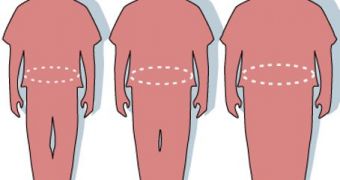In a new study, researchers demonstrate that not all obese individuals are unhealthy, or got so as a result of an unhealthy diet, combined with a sedentary lifestyle. At the same time, the work reveals that fatter people are at lower risks of developing certain conditions than their thinner peers.
The new investigation was carried out by scientists at the York University, in Canada. The study was published in the August 15 issue of the Journal of Applied Physiology, Nutrition and Metabolism.
The Canadian researchers say that their findings apply to those fat individuals who exhibit only minor physical, physiological and psychological impairments, and who also had a higher-than-normal body weight during their late teen and early adult years.
People in this group attempted, on average, to lose weight a lot less frequently than other obese individuals, and were much more satisfied with their body weight and appearance than their peers.
At the same time, the experts behind the work also determined that this particular subgroup was a lot less likely to experience the high incidence of strokes and cardiovascular diseases that other fat people display in official statistics.
One of the reasons for this is that people in this group were a lot more likely to engage in an active lifestyle, eat a balanced diet of fruits and vegetables and generally take better care of themselves. The study was led by York professor Jennifer Kuk.
Her investigation spanned more than 16 years, and covered a total of 6,000 fat Americans. The mortality rate this group exhibited was compared to that of a group consisting of lean people of normal weight for their age and height.
For the new study, the team used the Edmonton Obesity Staging System (EOSS), a new weight classification measurements that takes into account body-mass indexes, waist-to-hip ratios, and the extent or severity of pre-existing conditions such as cancer, mental illness, diabetes and heart disease.
Studies such as this one are very important because the UN World Health Organization (WHO) is estimating overweight and obesity to be the fifth leading risk for death in people around the world, PsychCentral reports.
Official data estimate that as many as 2.8 million people die annually as a result of complications associated with exceeding normal weight levels.

 14 DAY TRIAL //
14 DAY TRIAL //